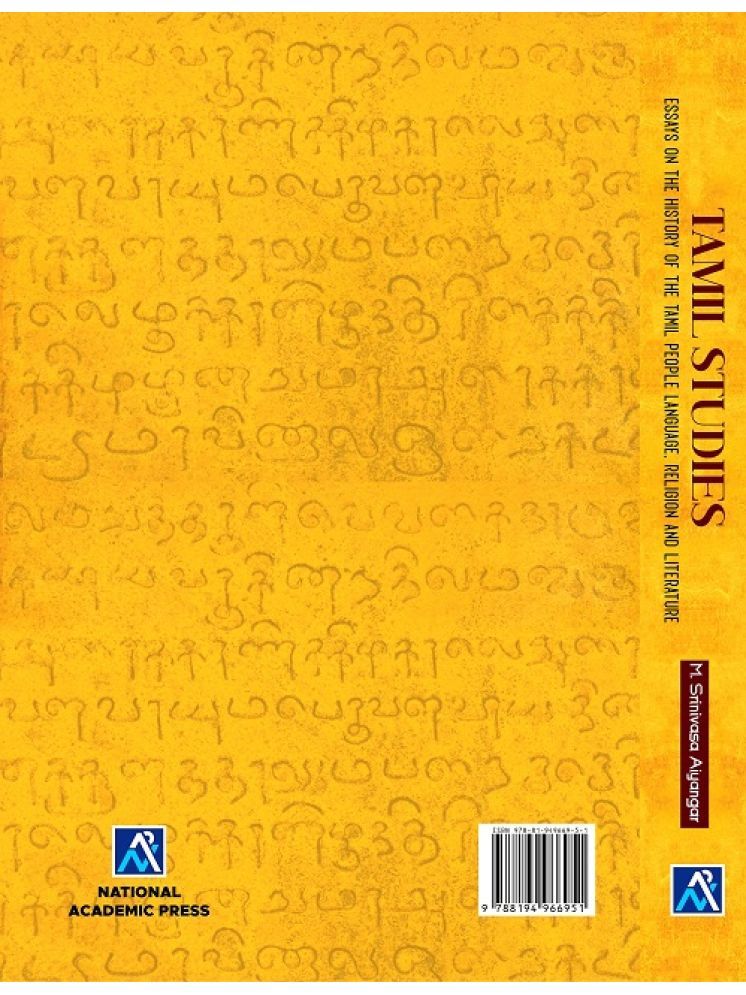It seems you are referring to Srinivasa Aiyangar, M.A.'s work Tamil Studies, a foundational text in the study of Tamil literature and culture. If you're encountering a "blur" in understanding specific sections or concepts of this book, it may be helpful to explore the broader themes and ideas that Aiyangar discusses.
Overview of Tamil Studies by Srinivasa Aiyangar:
Srinivasa Aiyangar was a distinguished scholar of Tamil language, literature, and history. His book, Tamil Studies, aims to highlight and preserve the vast and rich traditions of Tamil civilization, particularly its ancient literary and linguistic heritage. Aiyangar's work is crucial for understanding the classical foundations of Tamil and its role in the broader cultural and historical contexts of South India.
Here’s a breakdown of the main themes and key contributions from the book:
1. The Literary Heritage of Tamil
Tamil Literature’s Origins: Aiyangar delves into the origins of Tamil literature, with a focus on the Sangam literature (c. 300 BCE - 300 CE), which is the earliest known collection of Tamil poetry. He provides a detailed analysis of the themes of these works, such as heroism, love, ethics, and the relationship between human beings and nature.
Other Key Literary Works: He also discusses later Tamil literary works, including epics such as the Silappatikaram, Manimekalai, and the Tirukkural, examining their cultural, philosophical, and literary significance.
Poetry and Philosophy: Aiyangar gives attention to the philosophical and ethical underpinnings of Tamil poetry, especially the moral and social ideas present in classical Tamil texts.
2. The Language of Tamil
Linguistic Analysis: Aiyangar explores the structure and evolution of the Tamil language, which has a rich and long history. He discusses its roots in the Dravidian language family and how it developed over the centuries. His work provides insight into the phonetics, grammar, and syntax of classical Tamil.
Tamil and Other Dravidian Languages: There is also a comparative analysis of Tamil and other Dravidian languages like Telugu, Kannada, and Malayalam, highlighting both their similarities and differences.
The Evolution of Tamil: Aiyangar also traces the evolution of Tamil from ancient to modern forms, showing how the language adapted to societal and cultural changes over time.
3. Cultural and Historical Context
South Indian Civilization: Aiyangar’s work isn’t limited to literature and language; it also contextualizes Tamil works within the broader history and culture of South India. He addresses the role of Tamil culture in the development of religion (particularly Shaivism and Vaishnavism), the arts, and social structures in ancient Tamil society.
Colonial Influence on Tamil Studies: Given that Aiyangar’s work was written during the British colonial period, his views reflect the context of colonial scholarship. He often addresses the tensions between Western and traditional Indian thought, asserting the importance of preserving Tamil culture and literature against the dominance of English and Sanskrit.
4. Philosophy and Religion
The Philosophical Contributions of Tamil Literature: Aiyangar discusses the philosophical implications of Tamil literary works, including their treatment of ethics, duty, and the nature of human existence. He also considers how Tamil literature interacts with broader Indian philosophical systems, including the Vedantic traditions.
The Role of Religion in Tamil Literature: Many of the Tamil works he discusses are deeply religious in nature. He examines the connection between Tamil literature and religious movements like Shaivism and Bhakti, highlighting the spiritual aspects of Tamil poetry.
5. Impact of Tamil on Indian Culture
Tamil as a Unifying Force: Aiyangar often emphasizes how the Tamil language and literature have acted as a unifying force for the people of South India, particularly in the face of external influences like Sanskrit and later, British colonialism.
Cultural Nationalism: Aiyangar’s scholarship is also an early example of cultural nationalism, promoting the idea that Tamil literature is an essential part of India's ancient civilization and should be preserved and celebrated.


